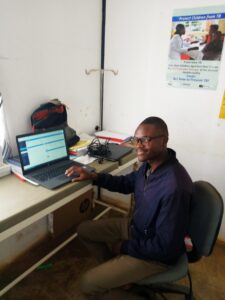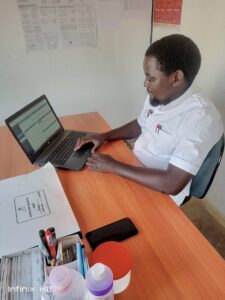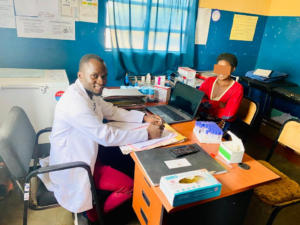
Dorothy Mukosa, Community Health Assistant, Kipoheshi Health Post
“We are very happy to finally have the eLMIS deployed to our facility. We will now be able to see in the system when specific medicine is running out, track consumption and submit reports in a timely manner. Before the deployment of eLMIS, we would fill out paper-based reports which had to be submitted to the District Health Office (DHO) for entry into the system. This would cause delays in reporting and delivery of commodities to our facility because sometimes we did not have transport to deliver our report and requisition (R&R) to the DHO” expressed Dorothy Mukosa, Community Health Assistant, Kipoheshi Health Post. She shared her excitement about the recent deployment of the electronic Logistics Management Information System (eLMIS) to her facility and the challenges the facility faced before its deployment.
As one of its objectives, the USAID Electronic Supply Chain Management Information System (eSCMIS) project, together with the Zambia Ministry of Health (MOH) have continued to deploy the electronic Logistics Management Information System (eLMIS) to health facilities in Zambia. The USAID eSCMIS project aims to rapidly deploy the eLMIS Facility Edition (FE) to more than 1,000 additional health facilities by the end of the project. To date, the project has deployed the eLMIS FE to 964 facilities in addition to the 638 facilities deployed in previous projects making the cumulative number of sites with eLMIS FE in the country 1,643.
Some of the most recent deployments were in the Copperbelt Province where 14 new eLMIS FE deployments were done in the province. Previously, facilities would travel long distances to submit handwritten reports and requisitions to their district hospitals or the DHO, among other challenges. Staff from some of the facilities shared the challenges they faced before the deployment of the system and what they expect to gain with the introduction of the eLMIS FE to their facilities.
What challenges did you face at the facility before the deployment of eLMIS FE?

Ackim Kabaghe, In-Charge, Chipese Health Post
“Sometimes we would use personal funds to travel to the DHO to submit reports and requisitions for commodities due to limited transportation at the facility. The delays in the process would sometimes result in the facility not being restocked for up to three to six months. Fortunately, at times we would get some supplies from overstocked facilities. When undersupplied, we could not meet client demands, hence denying some clients access to quality health services,” said Ackim Kabaghe, In-Charge, Chipese Health Post.
“For essential drugs and laboratory commodities we would use report and requisition booklets which we filled out by hand. We also used handwritten supply vouchers which were submitted to Kamuchanga District Hospital and the DHO. We would travel 18 kilometers to get to the DHO for order placement. Once DHO finishes packing our requested commodities, they would call us for collection, then we would have to travel again. With regards to tracking consumption, we would use stock control cards to check what we have in store at the facility – this was a lot of work,” said Webby Mulenga, Nurse, Chiwele Health Post.
“Most of the work was paper-based. This would cause delays because most rural health facilities are understaffed, and with the few staff having so many other things to do, there were not enough people to help with the preparation of reports. Moreover, we would travel 58 kilometers to submit reports, and order or collect supplies. Sometimes we would run out of supplies mid-month and we would not have transport to go to DHO so we would wait until month end for salaries to be in and we would combine our trip for home groceries with the trip to DHO for supplies requisition, in order to save costs,” narrated Davies Kunda, Clinician, Ipumbu Rural Health Center.
How has the introduction of eLMIS FE changed the way you work?

Webby Mulenga, Nurse, Chiwele Health Post
“With the system in place, my work has been simplified as I now take less time to check what we have at the facility and when it will expire. This is because I do not have to flip through stock cards, I can check for the information in the eLMIS system at the click of a few buttons. The compilation of reports has also been made easier compared to when we would write handwritten reports. With the system, I am able to create batch numbers for products received, place orders, do transaction reversals and adjustments and compile reports,” said Webby Mulenga.
Ackim Kabaghe also shared that, “The system has made the process accurate because we no longer have to do physical counts of commodities. It has also helped the overall handling of commodities – that is the arrangement of products according to batch numbers and being able to easily identify which batch to issue first and so on. This is because of the batch numbering system and expiry dates made available through the system.”
“The new way of reporting and requesting commodities through eLMIS will help with the timely delivery of commodities as we will no longer have to prepare time consuming handwritten reports or travel to DHO to order supplies and submit reports,” added Davies Kunda.
What is the expected impact of using the system on your work and the community you serve?

Davies Kunda (left) attends to client (right) at Ipumbu Rural Health Centre
“This will improve the delivery of services as this will help save time. Instead of having to travel to DHO for report and requisition submission, I will do it from the comfort of my office, thus minimizing my movements and allowing me to have more time to serve patients and plan for other activities at the facility,” expressed Webby Mulenga.
Davies Kunda added that, “This will help to ensure the availability of commodities at all times and result in quality and improved access to health services for our clients. Additionally, the reduced paperwork and time spent on writing reports will give us more time to focus on serving clients.”
The eLMIS is a next-generation digital logistics management system, which equips the Government of the Republic of Zambia to make data-driven supply chain decisions. A safe, secure, reliable, and sustainable supply chain will ensure the availability of essential medicines, laboratory commodities, and malaria, HIV and AIDS, and family planning products at health facilities throughout Zambia. The eLMIS covers the reporting needs and disbursement of medical supply to approximately 3,000 health facilities across Zambia using electronic data management to capture end-to-end supply and demand data. The results of this innovative supply chain system include reduced wastage from product expiry and increased efficiency in product availability in Zambia.
Funded by USAID and implemented by John Snow Health Zambia (JSH), the Electronic Supply Chain Management Information System project enables the Zambia Medicines and Medical Supplies Agency (ZAMMSA) to move products not just efficiently, but with visibility and strengthened security through the implementation of the eLMIS system.
